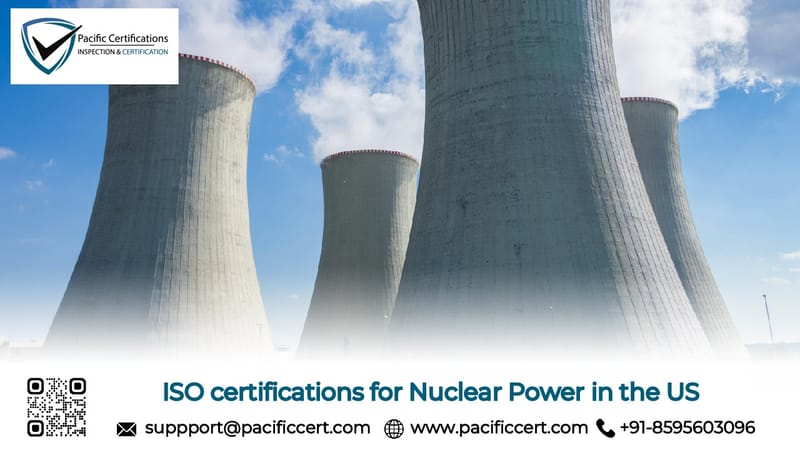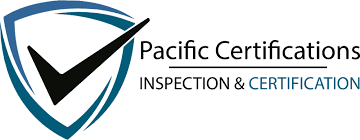ISO Certifications for Nuclear Power Industry in the US, Requirements and Benefits

ISO Certifications for Nuclear Power Industry
Nuclear power plays a significant role in the energy production landscape in the United States, providing a substantial percentage of the nation's electricity. The industry is known for its high safety standards and stringent regulations, given the potential hazards associated with nuclear energy.
To ensure that these standards are maintained and continuously improved, organizations involved in the nuclear power industry often seek ISO certifications. These certifications help maintain quality, environmental protection, occupational health and safety, and information security, critical elements in such a highly regulated sector.
In this blog, we will explore the various ISO standards applicable to the nuclear power industry in the US, the requirements for certification, the benefits of obtaining these certifications, and how Pacific Certifications can assist companies within this sector.
Applicable ISO Standards for Nuclear Power
Several ISO standards are relevant to the nuclear power industry. These standards ensure that nuclear power plants and associated services operate efficiently, safely, and sustainably. Some of the most applicable standards include:
ISO 9001:2015 – Quality Management Systems
ISO 9001 is the international standard for Quality Management Systems (QMS). Implementing ISO 9001 helps nuclear power facilities to standardize processes, ensure quality in services and products, and manage risks more effectively.
ISO 14001:2015 – Environmental Management Systems
ISO 14001 helps organizations in the nuclear sector to implement an Environmental Management System (EMS) that focuses on reducing environmental impact, compliance with legal requirements, and managing environmental risks effectively.
ISO 45001:2018 – Occupational Health and Safety Management Systems
Safety is one of the highest priorities in the nuclear industry due to the inherent risks involved in handling radioactive materials. ISO 45001 provides a framework for ensuring the health and safety of workers. It assists organizations in identifying hazards, mitigating risks, and ensuring a safe working environment.
ISO 27001:2022 – Information Security Management Systems
Given the sensitivity of data related to nuclear power plants, including operational details, safety protocols, and employee information, maintaining information security is crucial. ISO 27001 outlines the best practices for implementing a robust Information Security Management System (ISMS).
ISO 19443:2018 – Quality Management Systems for Suppliers in the Nuclear Energy Sector
ISO 19443 is specifically designed for organizations in the nuclear energy supply chain. It builds on ISO 9001 but adds nuclear-specific requirements, ensuring that suppliers and contractors meet the high standards required for the safe production of nuclear energy.
ISO 55001:2014 – Asset Management
In the nuclear industry, efficient asset management is essential for maintaining plant operations and ensuring safety. ISO 55001 sets the guidelines for developing an Asset Management System (AMS) that helps organizations manage the lifecycle of physical assets more effectively.
Click here to find out more applicable standards to your industry
What are the Requirements for ISO Certification in Nuclear Power Industry in the US?
The requirements for obtaining ISO certifications in the nuclear power industry vary based on the specific standard, but there are commonalities in the process:
Gap Analysis
Before starting the certification process, organizations should conduct a gap analysis to identify areas where their current operations may not meet the requirements of the desired ISO standard.
Management Commitment
Top management must be committed to achieving ISO certification. Their support is vital in aligning the organization’s goals with the standards' requirements and ensuring sufficient resources are allocated for the implementation of necessary changes.
Documentation
Each ISO standard requires thorough documentation of processes, procedures, and management systems.
Internal Audits
Internal audits are a critical part of the certification process. These audits help organizations identify non-conformities and areas for improvement before the official certification audit.
Continuous Improvement
Achieving ISO certification is not a one-time event; it requires continuous improvement. Organizations must regularly assess their processes and implement corrective actions to maintain compliance with the standards.
What are the Benefits of ISO Certification for Nuclear Power Companies?
The nuclear power industry faces many challenges, from maintaining public trust to ensuring the safety of its operations. ISO certifications offer a wide range of benefits to organizations in this sector:
- ISO certifications, such as ISO 45001 and ISO 9001, help organizations identify and mitigate potential risks associated with nuclear energy production.
- The nuclear power industry is subject to extensive regulatory requirements at both national and international levels.
- Standards like ISO 9001 and ISO 55001 focus on optimizing operational processes and asset management.
- ISO 14001 certification helps nuclear power companies reduce their environmental impact, particularly in waste management and emissions control.
- ISO certifications are recognized worldwide as a mark of quality and excellence.
- With the increasing risks of cyberattacks, protecting sensitive operational data is crucial for nuclear power plants.
How Pacific Certifications Can Help?
At Pacific Certifications, we specialize in providing audit and certification services to help organizations achieve ISO certifications. Our expertise lies in conducting thorough and impartial audits, ensuring that nuclear power companies meet the requirements of their chosen ISO standards. Here's how we can assist your nuclear power organization:
Certification Audits
We perform in-depth certification audits to assess whether your management systems comply with the relevant ISO standards. Our auditors have industry-specific expertise, ensuring that all aspects of your nuclear power operations are evaluated thoroughly.
Surveillance Audits
After certification, we conduct regular surveillance audits to ensure that your organization continues to meet the ISO standards' requirements.
Re-Certification
ISO certifications are valid for three years. At the end of the certification period, we perform a re-certification audit to ensure that your management systems remain compliant with the latest ISO standards.
Global Expertise
Our global network of auditors and certification professionals ensures that we can meet the specific needs of nuclear power companies, regardless of their location in the US. We stay updated with the latest trends, regulations, and changes in the industry to provide relevant and timely audit services.
At Pacific Certifications, we do not provide consultancy services, training, or implementation assistance. Instead, we focus solely on auditing and certifying your management systems, ensuring complete impartiality throughout the certification process.
Summary
ISO certifications are invaluable for the nuclear power industry, ensuring that organizations maintain the highest standards of safety, quality, environmental sustainability, and information security. With standards like ISO 9001, ISO 14001, ISO 45001 and ISO 27001, nuclear power plants can demonstrate their commitment to excellence and compliance with international regulations.
Pacific Certifications is accredited by ABIS, in case you need support with ISO certification for your Nuclear Power business in the US, please contact us at [email protected] or +91-8595603096.
Ready to get ISO certified?
Contact Pacific Certifications to begin your certification journey today!
Suggested Certifications –
Read more: Pacific Blogs

